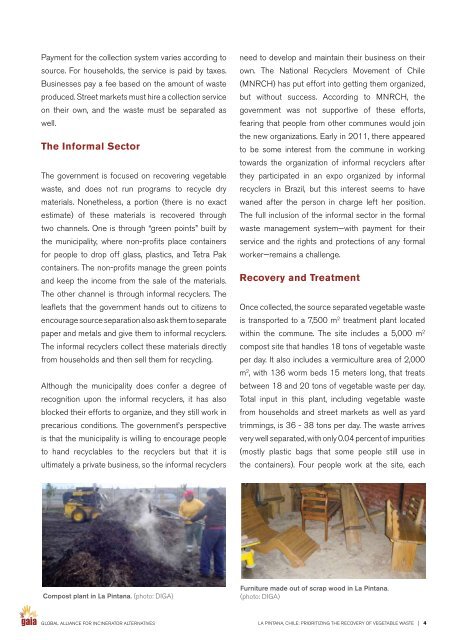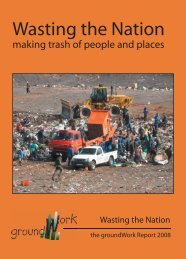La PinTana, ChiLe Prioritizing the recovery of vegetable Waste - GAIA
La PinTana, ChiLe Prioritizing the recovery of vegetable Waste - GAIA
La PinTana, ChiLe Prioritizing the recovery of vegetable Waste - GAIA
You also want an ePaper? Increase the reach of your titles
YUMPU automatically turns print PDFs into web optimized ePapers that Google loves.
Payment for <strong>the</strong> collection system varies according to<br />
source. For households, <strong>the</strong> service is paid by taxes.<br />
Businesses pay a fee based on <strong>the</strong> amount <strong>of</strong> waste<br />
produced. Street markets must hire a collection service<br />
on <strong>the</strong>ir own, and <strong>the</strong> waste must be separated as<br />
well.<br />
The Informal Sector<br />
The government is focused on recovering <strong>vegetable</strong><br />
waste, and does not run programs to recycle dry<br />
materials. None<strong>the</strong>less, a portion (<strong>the</strong>re is no exact<br />
estimate) <strong>of</strong> <strong>the</strong>se materials is recovered through<br />
two channels. One is through “green points” built by<br />
<strong>the</strong> municipality, where non-pr<strong>of</strong>its place containers<br />
for people to drop <strong>of</strong>f glass, plastics, and Tetra Pak<br />
containers. The non-pr<strong>of</strong>its manage <strong>the</strong> green points<br />
and keep <strong>the</strong> income from <strong>the</strong> sale <strong>of</strong> <strong>the</strong> materials.<br />
The o<strong>the</strong>r channel is through informal recyclers. The<br />
leaflets that <strong>the</strong> government hands out to citizens to<br />
encourage source separation also ask <strong>the</strong>m to separate<br />
paper and metals and give <strong>the</strong>m to informal recyclers.<br />
The informal recyclers collect <strong>the</strong>se materials directly<br />
from households and <strong>the</strong>n sell <strong>the</strong>m for recycling.<br />
Although <strong>the</strong> municipality does confer a degree <strong>of</strong><br />
recognition upon <strong>the</strong> informal recyclers, it has also<br />
blocked <strong>the</strong>ir efforts to organize, and <strong>the</strong>y still work in<br />
precarious conditions. The government’s perspective<br />
is that <strong>the</strong> municipality is willing to encourage people<br />
to hand recyclables to <strong>the</strong> recyclers but that it is<br />
ultimately a private business, so <strong>the</strong> informal recyclers<br />
need to develop and maintain <strong>the</strong>ir business on <strong>the</strong>ir<br />
own. The National Recyclers Movement <strong>of</strong> Chile<br />
(MNRCH) has put effort into getting <strong>the</strong>m organized,<br />
but without success. According to MNRCH, <strong>the</strong><br />
government was not supportive <strong>of</strong> <strong>the</strong>se efforts,<br />
fearing that people from o<strong>the</strong>r communes would join<br />
<strong>the</strong> new organizations. Early in 2011, <strong>the</strong>re appeared<br />
to be some interest from <strong>the</strong> commune in working<br />
towards <strong>the</strong> organization <strong>of</strong> informal recyclers after<br />
<strong>the</strong>y participated in an expo organized by informal<br />
recyclers in Brazil, but this interest seems to have<br />
waned after <strong>the</strong> person in charge left her position.<br />
The full inclusion <strong>of</strong> <strong>the</strong> informal sector in <strong>the</strong> formal<br />
waste management system—with payment for <strong>the</strong>ir<br />
service and <strong>the</strong> rights and protections <strong>of</strong> any formal<br />
worker—remains a challenge.<br />
Recovery and Treatment<br />
Once collected, <strong>the</strong> source separated <strong>vegetable</strong> waste<br />
is transported to a 7,500 m 2 treatment plant located<br />
within <strong>the</strong> commune. The site includes a 5,000 m 2<br />
compost site that handles 18 tons <strong>of</strong> <strong>vegetable</strong> waste<br />
per day. It also includes a vermiculture area <strong>of</strong> 2,000<br />
m 2 , with 136 worm beds 15 meters long, that treats<br />
between 18 and 20 tons <strong>of</strong> <strong>vegetable</strong> waste per day.<br />
Total input in this plant, including <strong>vegetable</strong> waste<br />
from households and street markets as well as yard<br />
trimmings, is 36 - 38 tons per day. The waste arrives<br />
very well separated, with only 0.04 percent <strong>of</strong> impurities<br />
(mostly plastic bags that some people still use in<br />
<strong>the</strong> containers). Four people work at <strong>the</strong> site, each<br />
Compost plant in <strong>La</strong> Pintana. (photo: DIGA)<br />
Furniture made out <strong>of</strong> scrap wood in <strong>La</strong> Pintana.<br />
(photo: DIGA)<br />
Global Alliance for Incinerator Alternatives<br />
<strong>La</strong> Pintana, Chile: <strong>Prioritizing</strong> <strong>the</strong> Recovery <strong>of</strong> Vegetable <strong>Waste</strong> | 4

















